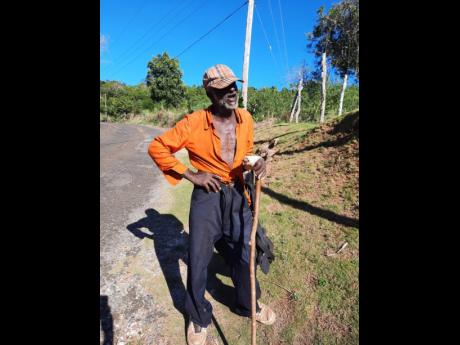‘I still don’t get the vaccine yet’
Effectiveness of community health aides engagement questioned as jabs go to waste
Ten weeks after Eustace Wilson indicated his willingness to be vaccinated and after 15 residents lost their lives to COVID-19 in Cocoa Walk and the surrounding areas of Marlie Hill in Manchester, the 81-year-old is yet to receive a single jab despite the Ministry of Health and Wellness indicating that community health aides are on the ground to promote vaccination in several parishes, including Manchester.
Elderly, poor, blind, and living alone, Wilson is grateful for the “little something” from the Programme of Advancement Through Health and Education, as relatives help to prepare meals.
Despite living roughly two miles from the Cross Keys Health Centre, he is yet to be located by any of the community health aides, which number roughly 1,500 across the island.
Initially hesitant to take a COVID-19 shot – citing his survival of other major catastrophes such as hurricanes Charlie in 1951 and Gilbert in 1988, and many others along the way – Wilson, who has been blind for 40 years, uses his makeshift cane to roam the communities of Cocoa Walk and Marlie Hill without a mask, unable to locate it whenever he takes it off.
The craters in the roads from Cross Keys to Marlie Hill have thrown him to the ground uncountable times as he sometimes falls victim to the gullies along the banks of the road, which he hugs because of his disability.
It’s a hard life, but that’s his life.
When the virus walked through the community and took home 15 elderly residents in September, Wilson changed his mind.
“If I could get someone to carry me, I would take the vaccine,” he told The Sunday Gleaner then.
But even with millions of dollars worth of vaccines heading for the dump due to expiration largely blamed on the population’s unwillingness to take the shots, Wilson is yearning for his day to come.
Last Thursday, he was observed making his way along the badly damaged roads of Old House, heading to a community shop.
WILSON’S REALITY
With everything pitch-black and not much difference between night and day in his life, Wilson said he knows it is daylight whenever the neighbour’s cock crows in the distance.
“I still don’t get the injection yet, my good love. Nobody want to carry me, you know, and as you know, I am blind. But if they could come to me, I would take it,” he told The Sunday Gleaner.
Health Minister Dr Christopher Tufton told our newsroom that the community health aides have been deployed islandwide “visiting homes, promoting vaccination, among other things”.
However, it appeared that the aides assigned to the clinic at Cross Keys were not among those engaged for community visits.
At 3:30 p.m. on Thursday, they were observed heading to respective vehicles to leave the Cross Keys clinic. The public health nurse was not there that day and other trained nursing personnel were seen working in other areas. A staff conference was scheduled for the following day and our news team was unable to return to speak with her then.
The Sunday Gleaner learnt that the health centre is classified as a sub-station and takes instructions from the Manchester Health Department.
Mid-morning Friday, a Ministry of Health vehicle was seen in the vicinity of the nearby infant and primary school at Marlie Hill, which began engaging kindergarten pupils in face-to-face classes last week. Preparations were under way for students at the primary level to return to the classroom tomorrow.
Residents complained that the health aides were “rooted at the clinic” and were not seen engaging the community.
“They come, they sit in the clinic, depending on whatever is being done on that day, and they eat lunch and when time come they go home a dem yard,” said one resident. Informed of the complaint, Tufton told The Sunday Gleaner: “They can be requested to visit an area. The public health nurse can direct them to visit areas.”
Devona Myers-Grant was among the first batch of Jamaicans to be trained as community health aides in the 1970s and was assigned to the Cross Keys Health Centre.
HEALTH AIDE EXPERIENCE BACK IN THE ’70S
“Sitting at the clinic was not part of the programme. We would report to the clinic in the mornings and be dispatched from there to communities in the area of our responsibility. There were four of us at the time and Marlie Hill and Cocoa Walk were two communities that I had,” she recalled more than 40 years later.
“We were never trained to give vaccinations, but we would accompany the public health nurse and we would do all the administrative work. We would get the details of the children who received vaccination, and then we would come back to the clinic and input it in the clinic book,” the now-United States-based Myers-Grant explained.
“Some people, like myself, did additional courses and training. I recalled that we could give insulin injections [for diabetes]. I would go to the homes of the sick and infirm. I would dress wounds, especially among adults and those with diabetes; do home baths and even spread the beds and cook if the resources were available,” she recalled.
Myers-Grant remembers the elderly Wilson and said that in her time, it was impossible for someone like him to be missed because of the detailed geographical areas of responsibilities.
“It was mandatory for home visits to young breastfeeding mothers. We would show them how to bathe the baby and how to make porridges for them. There were days for both pre- and post-natal clinics, and if someone was absent and it was noticeable, the public health nurse would send us to their homes to find out what’s happening,” she recounted, adding that either the training or impact of those currently serving in community health has declined.
Roughly 15 per cent f Jamaicans have so far been fully vaccinated.

